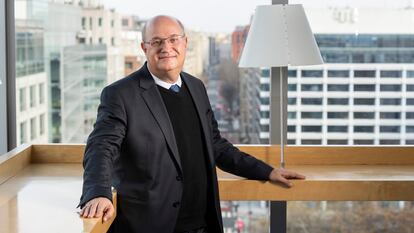Brazil’s Ilan Goldfajn elected new IDB president
The former central bank chief won by a wide margin and will replace the ousted Mauricio Claver-Carone at the helm of Latin America’s largest development lender

Ilan Goldfajn, a former president of the Central Bank of Brazil, was overwhelmingly elected in the first round of voting on November 20 as the new president of the Inter-American Development Bank (IDB), Latin America’s largest development lender. The 56-year-old Goldfajn won 80.08% of the vote and the support of 17 regional governors, two more than the minimum needed to secure the appointment.
The November 20 election came after IDB governors dismissed former president Mauricio Claver-Carone last month. Claver-Carone, an American nominated for the post by Donald Trump in 2020, was fired after an investigation into allegations that he had an intimate relationship with a subordinate who received unusual salary increases and other favorable treatment.
Employees at IDB, a major regional lender, described a “regime of terror” under Claver-Carone and said they lived in fear of reprisals after the probe was launched, several people told this newspaper.
The IDB’s news release stated, “Ilan Goldfajn was elected president of the Inter-American Development Bank (IDB) today during a Special Meeting of the Bank’s Board of Governors. The meeting was held at IDB Headquarters in Washington, DC, with delegations attending virtually and in person.”
Goldfajn, who will vacate the post of Director of the International Monetary Fund’s (IMF) Western Hemisphere Department, beat out three other candidates after Argentina withdrew its nominee, Cecilia Todesca Bocco, and endorsed Goldfajn. With three of the largest IDB shareholders – Argentina, the United States and Canada – backing Goldfajn, the election process moved quickly, and a second round of voting was not needed.
Chile’s Nicolás Eyzaguirre came in second with 9.93% of the vote and the support of two regional governors. The Mexican candidate, Gerardo Esquivel, obtained 8.21% of the vote and the green light from three regional governors. Trinidad and Tobago’s candidate, Gerard Johnson, who had the backing of the Caribbean nations, gained the support of six regional governors, but only won 1.61% of the vote.
The new IDB president, who will helm the multilateral lending institution for the next five years, has extensive experience in the public and private financial sector. Born in Haifa (Israel) and educated in Rio de Janeiro and the Massachusetts Institute of Technology (MIT), he first served the Central Bank of Brazil as its vice-president, and later as president (2016-2019). He has also managed Credit Suisse’s operations in Brazil and worked as Itaú Unibanco’s chief economist.
In a recent interview with EL PAÍS, Goldfajn said that he wants the bank to act independently and resist ideological influences. Decision-making will be “based on facts” and data. His top priorities are: the fight against poverty and inequality, including improved food production and distribution; the fight against climate change, which is already having dramatic impacts on Central America and the Caribbean; and development of physical and digital infrastructures to improve connectivity throughout the region.
When Brazil officially nominated Goldfajn on October 24, it stressed his “broad and successful experience in the public sector, multilateral organizations and the private sector, as well as his solid academic qualifications.”
Although Goldfajn was the most qualified and experienced candidate, his nomination by outgoing President Jair Bolsonaro caused some controversy in Brazil. President-elect Luiz Inácio Lula da Silva and his transition team wanted a postponement of the IDB election so that the incoming administration could nominate a candidate. Nevertheless, Lula said he was comfortable with Goldfajn representing Brazil. “No one has any objection,” said a former governor of the Central Bank of Brazil.
Goldfajn will be the IDB’s seventh president after taking the reins from interim President Reina Irene Mejía Chacón (2022). He follows Mauricio Claver-Carone (2020-2022); Luis Alberto Moreno (2005-2020); Enrique V. Iglesias (1988-2005); Antonio Ortiz Mena (1971-1988); and Felipe Herrera (1960-1971). Founded in 1959, the IDB financed close to US$23 billion in development project loans last year.
Tu suscripción se está usando en otro dispositivo
¿Quieres añadir otro usuario a tu suscripción?
Si continúas leyendo en este dispositivo, no se podrá leer en el otro.
FlechaTu suscripción se está usando en otro dispositivo y solo puedes acceder a EL PAÍS desde un dispositivo a la vez.
Si quieres compartir tu cuenta, cambia tu suscripción a la modalidad Premium, así podrás añadir otro usuario. Cada uno accederá con su propia cuenta de email, lo que os permitirá personalizar vuestra experiencia en EL PAÍS.
¿Tienes una suscripción de empresa? Accede aquí para contratar más cuentas.
En el caso de no saber quién está usando tu cuenta, te recomendamos cambiar tu contraseña aquí.
Si decides continuar compartiendo tu cuenta, este mensaje se mostrará en tu dispositivo y en el de la otra persona que está usando tu cuenta de forma indefinida, afectando a tu experiencia de lectura. Puedes consultar aquí los términos y condiciones de la suscripción digital.








































